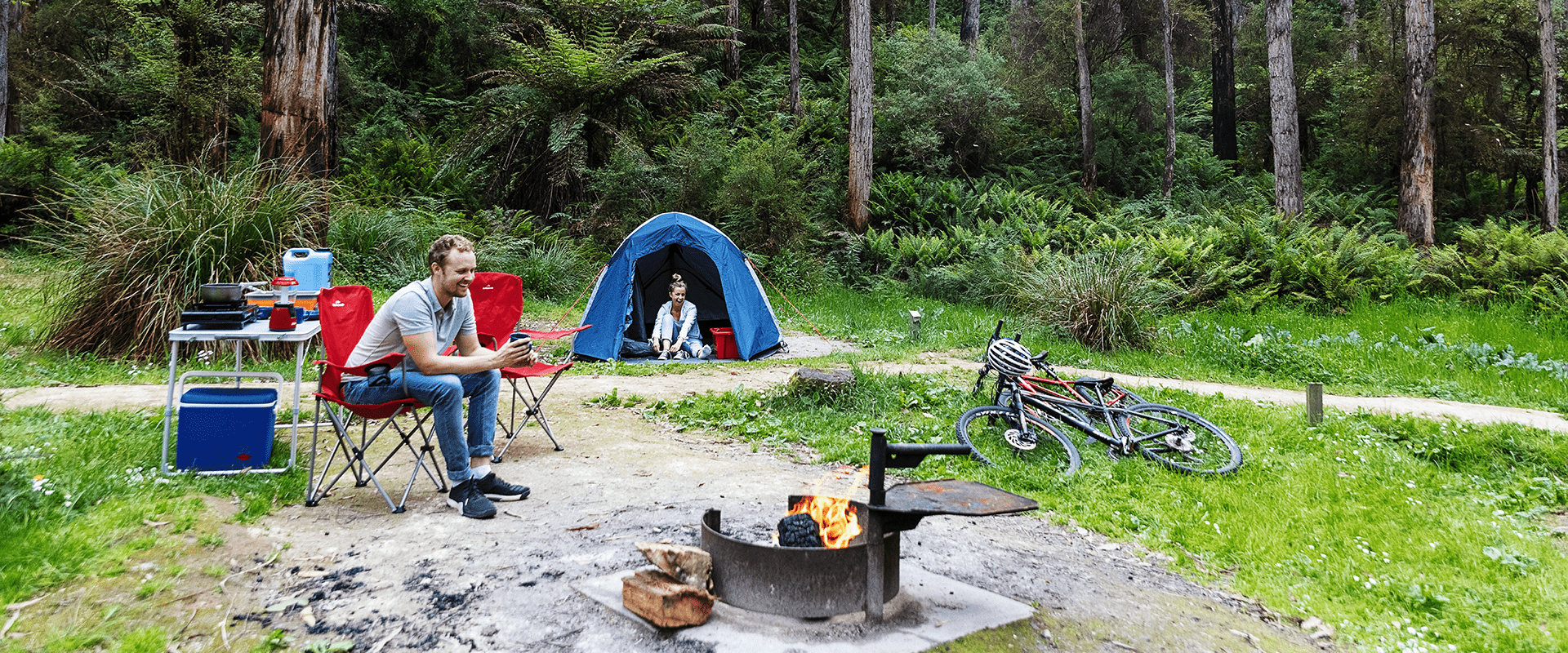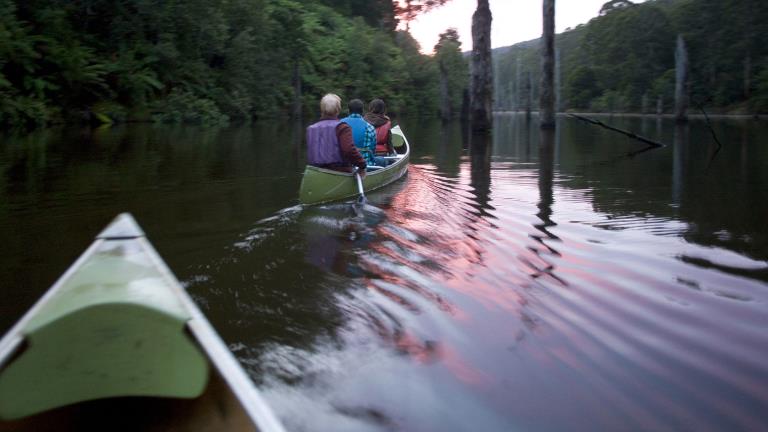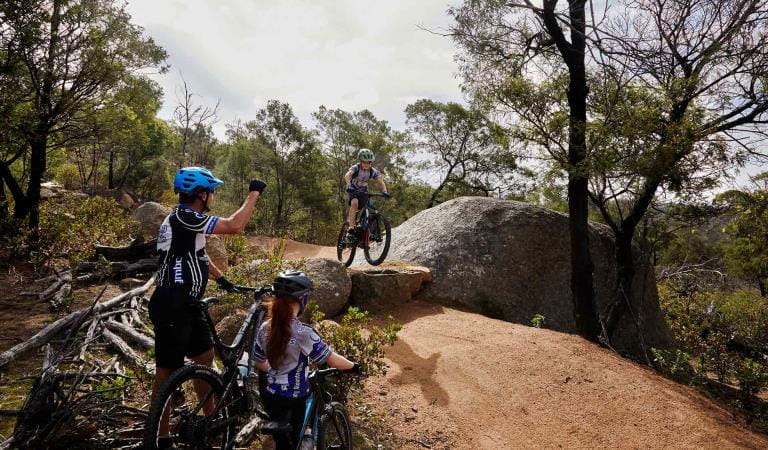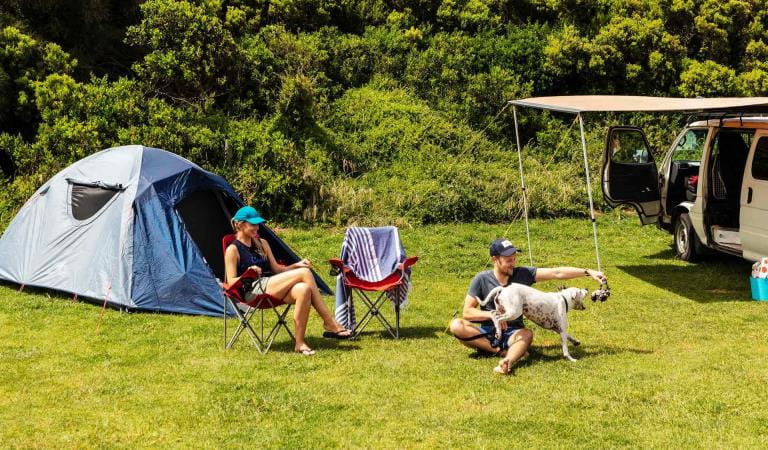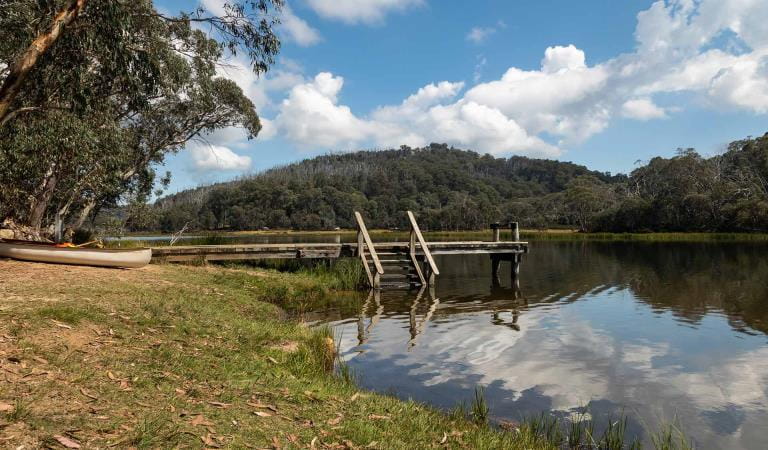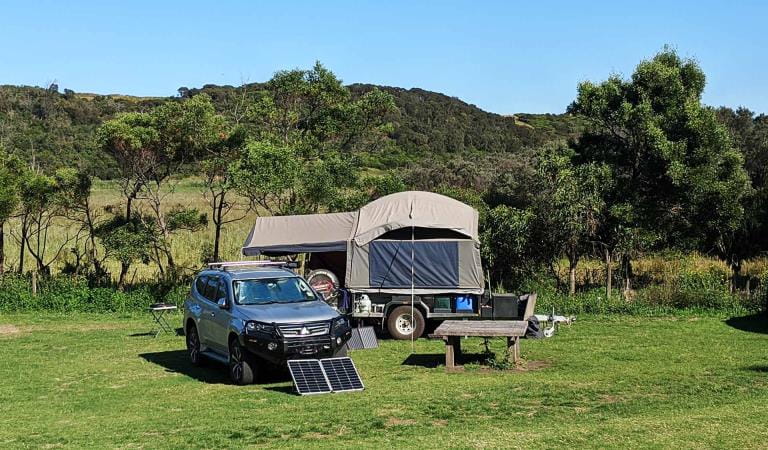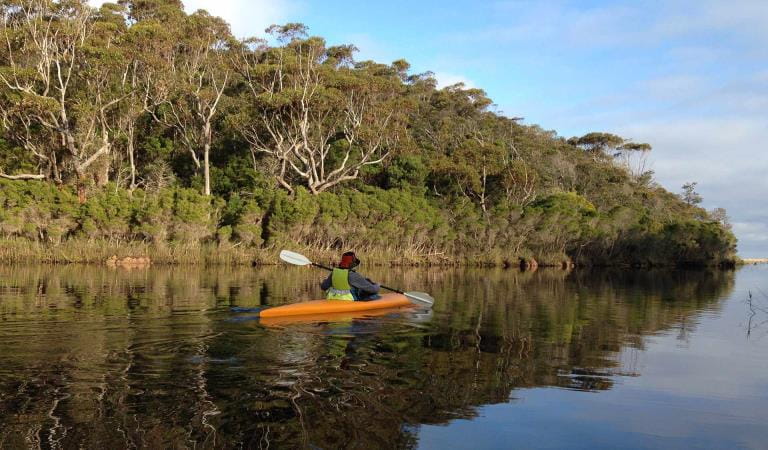Explore
Lake Elizabeth Campground
Lake Elizabeth Campground is a dogs-on-lead camping area. Sheltered by tall eucalypt trees it nestles beside the small Barwon River. Lake Elizabeth is a short 1km walk away. Forrest Mountain Bike Trailhead is at the Day Visitor Carpark. Pitch a tent in the small campground. Look and listen for Satin Bowerbirds and inquisitive Superb Fairy-wrens and Eastern Yellow Robins.
There are 20 campsites accommodating up to six people per site. All campsites are unpowered and are suitable for tents only. There is no direct vehicle access to the campsites. A 15-minute unloading bay is located close by and a separate carpark is located above and behind the campground just a two minute walk away.
Non flush toilets, shared fireplaces and picnic tables are provided. Dogs are permitted on-lead.
Once you're unpacked and set up, walk the 1km to beautiful Lake Elizabeth. Flooded after a landslip created a natural dam, the lake is scattered with the still-upright trunks of dead trees, giving an eerie atmosphere to the valley. Platypus are sometimes seen early morning and at dusk in the still waters. A host of birds live in the area and Satin Bowerbirds (the male dark satin blue and the female is olive green) are often seen near the camping round. Wrens, robins and grey shrike thrush also visit regularly. You may see glowworms beside this track after dark.
Dogs should be kept on-lead to reduce their impact on native wildlife and to preserve their health and your dogs as snakes are common in this area and its walks. There is poor mobile phone reception here.
Explore the area by walking, canoeing, mountain biking and four-wheel driving. Birdwatching is popular here. The village of Forrest is nearby for supplies and is a major mountain bike trailhead for the area's cycling network.
As rivers, lakes and reservoirs are natural environments, you may encounter hazards. Follow our water safety advice to make sure your day out at Lake Elizabeth is a safe and enjoyable one.
Things to do
Canoeing and Kayaking
Mountain biking
Dog friendly camping
How to get there
Lake Elizabeth Campground
When you're there
A 40-minute drive south takes you to the Great Ocean Road and the many waterfalls and other attractions along this famous drive. Forrest itself is a mountain bike trailhead hub. You can ride to it from the campground via the Baridjaru Trail. Download the visitor guide before you go.
Need to know
Lake Elizabeth Campground
Accessibility
Lake Elizabeth Day Visitor and Camping facility has all ability access. Forested areas generally are more difficult grade walks often with steps and minor creek crossings. Lake Elizabeth Loop Walk Grade 3. the walk has some steps, uneven surfaces and is not an all abilities walk.
Be prepared and stay safe
Lake Elizabeth Campground is in the Great Otway National Park in the South West fire district. Bushfires can occur during the warmer months. It is your responsibility to check current and forecast weather conditions. Campfires cannot be lit on days of Total Fire Ban, however gas cookers can be used for preparing food.
Check the Fire Danger Rating and for days of Total Fire Ban at emergency.vic.gov.au, on the Vic Emergency App or call the Vic Emergency Hotline 1800 226 226.
Change of Conditions
Nature being nature, sometimes conditions can change at short notice. It’s a good idea to check this page ahead of your visit for any updates.
-
Notices Affecting Multiple Sites
Great Otway National park sites closed due to major flood damage
Severe thunderstorms and flash flooding on 16 January 2026 has caused significant damage across parts of the eastern Great Otway National Park.For public safety, the following areas are closed until further notice while assessments and clean-up works are undertaken:Closures included but are not limited to :Erskine falls is limited to the top viewing platform. Access to the base of the falls and along the river track is closed.Roads & TracksWye RdWye TrackCurtis TrackGodfrey TrackJamieson Track
Walking tracks
St George
Phantom falls
Lemonade ck
Kalimna
Henderson
Sheoak FallsSheoak picnic ground walking Nature LoopCumberland
Cumberland Garvey Link
Kalimna Garvey LinkCora LynnErskine Falls Walking TrackWon WondahMany roads, tracks and visitor facilities are impacted by debris, flooding and unstable conditions.The Great Ocean Road has been impacted,Always follow safety signage and directions from response crews, and do not enter any closed areas.Thank you for your patience and understanding as works are undertaken to make these popular areas safe to visit again.
Great Ocean Walk destination car parking at the Twelve Apostles visitor center during summer & Peak Visitation periods
During the busy peak visitation period at the Twelve Apostles precinct (from summer through to early autumn including school holidays, public holidays, long weekends & busy peak visitation weekends concluding after Chinese New Year / Easter), due to the sheer volume of visitors onsite, a traffic management program is in place to maximize public safety & ensure visitor experience. If you are planning to park your vehicle at the Twelve Apostles before walking the Great Ocean Walk (or sections of it including section 8) during this period, please communicate this information to onsite traffic control staff at the entrance & they will do their best to accommodate your vehicle in the main carpark. This will avoid your car remaining in the overflow carpark area which needs to be cleared and locked each night. Similarly, if you arrive at the Twelve Apostles to park your car at a time when traffic control are not onsite, or setting up, please park your vehicle in the main carpark area. Your assistance is greatly appreciated!


